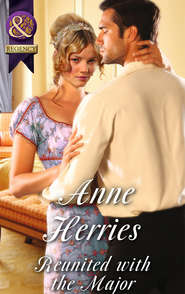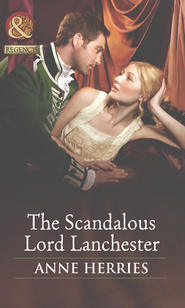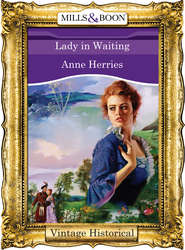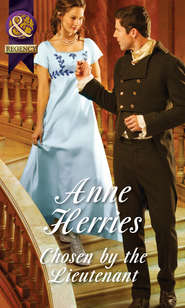По всем вопросам обращайтесь на: info@litportal.ru
(©) 2003-2025.
✖
The Lord's Forced Bride
Настройки чтения
Размер шрифта
Высота строк
Поля
‘It might be too late by then,’ Anne said, and, jumping up, ran from the room.
Catherine stared after her. What was wrong? Anne was always an impulsive girl, but she did not normally behave in such a way. Something must have upset her. Catherine finished unpicking all the bad stitches her sister had made and then replaced them, because her mother wanted the cover for a cushion she needed for her chair. She would talk to Anne later and see if she would tell her what was wrong, but for the moment she wanted to be alone with her thoughts.
Marriage was such a big step. It would mean that she would no longer be able to spend her days with her mother, sister and brother…instead she would be the mistress of a large house with all the cares that entailed. Her mother had taught her all the things she needed to know to perform those duties, but no one had told her what it was really like to be married.
Catherine had some ideas about how babies were made, for she had seen the yard dogs mating, and watched puppies come into the world…but surely there must be more? Lady Melford was very contented; sometimes when she and her husband were together her eyes would shine with happiness. If only Catherine could be as happy when she married! She had listened to the storyteller spin his fables of romance when he visited them at Christmas and for feasts, and she thought that it would be wonderful to find true love—but did it really exist? And would she find it in an arranged marriage?
A rebellious look came into Catherine’s eyes. She would never willingly displease her father, but if William Shearer had not improved his manners, she would never wish to marry him!
Andrew dismounted as soon as he realised his horse had gone lame. The animal was a favourite and he did not wish to cause more damage or pain. He had hoped to be in London by nightfall, but he must lead the horse to the nearest inn and have it attended.
He supposed that it did not matter, for he had no particular reason to hurry. He was not expected back for a few days, and he was reluctant to renew his affair with Lady Henrietta. He regretted now that he had given in to her charms on his last visit to court. He suspected that she could be petulant, perhaps vindictive, and would not take it kindly if he tried to finish the relationship.
At one time he had considered her a suitable match, which she was in many respects, but he had suddenly realised that he had no real affection for her. Marriage to such a woman would be a mistake. He would never quite trust her, and a man must know that his sons were his own. However, to break off the affair suddenly would be cruel and pointless. He must find a way of detaching himself from her gently, and that would take time. His best hope was that she would grow tired of waiting and decide to bestow her considerable charms on another.
He had been slowly leading his horse for almost half an hour when he saw the inn ahead. He sighed with relief, for he could find shelter there for himself and his horse. No doubt the innkeeper would know where he could find a blacksmith to attend to the matter of the loose shoe.
He was welcomed into the inn by the genial host, who was pleased to offer supper and a room for the night, as well as to have the blacksmith summoned for the gentleman’s horse.
‘If your lordship would kindly go into the parlour and wait, my wife will bring soup immediately, and there are some good chops, a capon and a meat pie to follow if your honour should care for it?’
‘Soup and the capon will be sufficient, thank you,’ Andrew said. He nodded to the host and went into the parlour, where he saw three men sitting together huddled by the fire. It was not truly cold out and he thought there was something odd in their manner, but they gave him no more than a glance before getting up and walking out.
Andrew was pleased that they had gone, for they had looked like rogues to him, and he would sleep easier if they were elsewhere. A man in his position normally travelled with a considerable train of servants and men-at-arms, but sometimes he preferred to travel alone. He walked over to the fire, a torn scrap of vellum catching his eye. Bending down to retrieve it, he saw that two words remained legible of whatever the paper had contained.
‘Must die…’ he read and frowned over the cryptic message. What could it mean? As it stood it was useless, for there were no details of who or what must die. Had it not been for the shifty look of the men who had left as soon as he arrived, Andrew might have tossed the scrap of parchment into the fire, but something made him slip it into his jerkin. It was probably nothing, and yet he had an uneasy feeling that those rogues were up to no good. Were they planning to murder someone? Had the whole of this note contained instructions for someone’s death?
Andrew went to the window and looked out. The three men had mounted up and were about to ride off when something clicked in his mind. He had surely seen at least one of them before. He could swear that he had wounded the man with the lank hair and a scar on his cheek only a few weeks back. It was when he had come upon the young man fighting so valiantly for his life in a clearing!
He swore in frustration, for if he had recognised the man sooner he might have called a constable and had the rogue arrested. He was certain now that they had been plotting something. There was nothing he could do, for men like those three were plentiful and, despite all the measures the King had taken to control the lawlessness that had once been rife in England, murder and robbery happened all too often. It was perhaps unwise to travel alone, though Andrew was now in the habit of doing so when he could. He dressed modestly and never carried much gold so as not to invite attack.
He had no idea who the rogues had in mind and could have done little to stop them if he had. He could only hope that the young man he had helped once before had arrived safely at his destination. It was odd that he should have forgotten the rogue until the last moment, but perhaps that was because he had other things on his mind.
‘Take care of yourself, my dearest,’ Lady Melford said and embraced her daughter. There was a suspicion of tears in her eyes despite her warm smile, as she had hoped to be there to guide her daughter through the difficulties of making a first appearance at court. ‘Remember that I shall always love you. I shall be thinking of you while you are away, Catherine.’
‘Thank you, Mother,’ Catherine said and hugged her. At this moment of parting she could not help feeling nervous. It was true that her maidservant, Tilda, was to accompany her, but she would have liked to be able to ask her mother for advice when they attended the court. Lady Melford had shown her how to curtsy and told her always to behave modestly, and Catherine knew that her brother would be there. None the less, now that they were about to depart, she could not help wishing her mother was coming with her. She turned to her sister and kissed her cheek. Anne had been pale and silent the past few days, refusing to tell her what was upsetting her. ‘I shall bring you a gift from London—what would you like, dearest?’
‘I want nothing,’ Anne said and shrugged off her sister’s hand.
‘I shall find some trinket that will please you,’ Catherine promised. She was thoughtful as she turned away, giving her hand to her groom. She smiled at him as he helped her to mount her palfrey. Catherine was an excellent equestrienne, well able to ride herself, and preferring it to riding pillion as was the custom for many ladies. ‘Thank you, Dickon.’
Her father had made his goodbyes earlier as he was still unable to walk more than a few steps from his bed, but he had kissed her forehead, told her to mind her brother and Lady Anne and wished her well. Her brother was waiting for her, and Catherine’s serving woman, Tilda, was riding pillion behind one of the several grooms, and was just ahead of Catherine as she gave the reins a little flick and rode after them with Dickon following at her back. They had three more grooms and six servants trained as men-at-arms riding with them, because it was as well not to go unprepared, and Rob had wanted his daughter to be well protected on the road. Their baggage was carried on a cart that was protected by another three men and had set off an hour earlier so it would be waiting for them at the inn where they had arranged to spend the night.
The times might not be as lawless in King Henry VII’s England as they had once been, but there were still beggars roaming the country, and sometimes bands of robbers who might attack the unwary. Lord Melford had made certain that his daughter would be shielded from any such attack.
Catherine felt excited to be starting her journey. Her grandfather, Owen Davies, had given Catherine her palfrey for her last birthday, and it was a spirited beast, but well trained. She had called it Frosty because of its pure white coat, and loved it dearly.
It felt good to be out riding with her brother and their attendants, and as they passed through the countryside near Melford people came to the side of the road to wave and bow their heads respectfully. Robert of Melford was respected as an honest, fair man; his people liked working for him, because he was a generous master and treated them with the respect he showed to others. This reflected in the way they treated his family, and the women waved to Catherine as she passed, wishing her a safe journey. She smiled and waved back to them, her feeling of excitement growing all the time, though she was also a little nervous, because she had never been further than Shrewsbury in her life.
Once she had left her home far behind, her nerves began to settle and she felt a return of the excitement she had experienced at the start. Her disappointment at leaving her mother and sister behind was fading as she wondered what it would be like at court. Her mother had told her that some of the ladies would be wearing wonderful clothes and jewels, and her brother had some beautiful things in his saddlebags that Lady Melford had told her she might borrow for her court appearance. She knew that she was to have some new gowns when she reached town, for her mother had written some two weeks ago to order them from a dressmaker she patronised when in London, and Catherine would be fitted when she arrived. It was all so very exciting that she had begun to wish the journey over.
It was midday when they stopped to take some refreshment at an inn her father had recommended. Messengers had gone ahead and the landlord came out, bowing and smiling as he welcomed Lord Melford’s son and daughter into his house. Hot soup and fresh bread were provided, which were washed down with ale. The drink was very strong and Catherine took only a few sips, though she enjoyed the chicken broth.
They stopped only long enough to rest the horses, soon setting out again on the second stage of their journey. They would sleep at the house of one of Lord Melford’s friends that night and go on the next day. Catherine was used to riding distances of some leagues, for she had been to Shrewsbury a few times with her mother, but she had begun to think that she would be glad to reach their final stopping place for the day.
It was as they reached a narrow road that was bordered on two sides by dense trees that some men rushed out from the trees and tried to grab Harry’s horse. Taken by surprise, he was slow in drawing his weapon and the men dragged him from his mount. Catherine screamed and the armed servants rushed to assist Harry, but one of the ruffians held a dagger to his throat.
‘Come any nearer and he dies!’
‘Let him go!’ Catherine cried, jumping from her horse and rushing towards them. ‘You can gain nothing from harming him!’ Fear for her twin made her rush at the nearest man, throwing herself at him, kicking and punching him with her fists. ‘Let my brother go, I tell you!’
Some of the men-at-arms had dismounted and were hesitating, half-afraid to attack even though Catherine was still fighting valiantly. However, the sound of a bloodcurdling yell and the crack of a musket from behind the rogues made the one holding Harry jump as if startled, and in that instant Harry broke free and drew his sword. The men-at-arms set upon the rogues as soon as they saw that Harry no longer had a knife to his throat and a bloody battle ensued; in seconds two of the rogues lay dying on the ground and three more fled into the trees, where they were set upon by a roaring fury on his horse. He cut down two of them, and the third was pursued by the men-at-arms.
Catherine was shaking, trembling with fright. It had all happened so quickly and she had acted impulsively without a thought for her own safety. Harry drew her into his arms, comforting her as she burst into tears.
‘Hush, my dearest one,’ he soothed, stroking her hair. ‘You should not weep. It is all over and, thanks to you, I am still alive.’
Catherine shook her head, for she knew that her efforts would have been useless had that yell and musket fire not distracted the rogues.
‘It was not I that saved you…’ She looked towards the trees and saw that the newcomer had dismounted and was directing some of their servants to carry away the bodies of the dead. ‘It was this gentleman—’ Her breath caught as the man came towards them and she realised that she knew him. He was the man who had looked at her so boldly, making that outrageous suggestion to her in the village—the man who had paid her father a visit.
Harry turned to look. For a moment he stared at his saviour and then a grin broke over his handsome face. ‘Damn it, if you haven’t saved my life again, Andrew! What coincidence brought you here?’
‘Harry,’ Andrew replied and smiled oddly. ‘It was fortunate that I chanced this way at the right moment, for I am certain they meant to kill you.’
‘And they might have done had my brave sister not flown at them like a she-devil,’ Harry said, looking at Catherine with affection. ‘She had no thought for herself, but we are twins and I would give my life for her if need be.’
Andrew turned to look at Catherine. He knew her instantly, for her face had seldom been out of his mind these past weeks. However, she was far more richly dressed than she had been that day in Melford Village, and he understood that she was of good family.
‘Mistress,’ he said, inclining his head to her. ‘I am Andrew, Earl of Gifford, at your service. You were brave, if a trifle foolhardy. Those rogues would have thought nothing of slitting your throat—and that would have been a tragedy.’
Catherine’s face was pale, but there was pride in her eyes as she looked at him. ‘I would never stand by and see my brother murdered. They might take my life if they pleased, for I could not bear to live if he was so cruelly slain.’
Her twin put at an arm around her shoulder, ‘We are Catherine and Harry Melford, the first born of Lord Robert of Melford,’ Harry told Andrew. ‘Last time you helped me I was on a secret mission and we agreed not to exchange names, but this time we go to court. My sister is to be presented and I am bidden to attend Prince Arthur’s wedding.’
‘As am I,’ Andrew said. ‘We may as well journey together. There is safety in numbers, though I often travel alone—but your sister needs protection, and we cannot be sure that you will not be attacked by another band of rogues.’
‘I should be glad of your company,’ Harry replied. ‘Catherine, you must remount…’
‘Perhaps I may assist?’ Andrew moved towards her palfrey, which the groom had ready. He offered her his hand, and when she came to him, he placed one hand each side of her waist and tossed her up effortlessly. For a moment he stood gazing up at her as she took hold of her reins, his eyes dark with some emotion she could not read. ‘Can you ride, Mistress Melford? Your experience has not shocked you too much? I could take you up with me if you felt faint or ill at ease.’
‘I thank you kindly, sir,’ she replied, a faint blush in her cheeks, ‘but I am well able to ride my horse. I do thank you, though, for coming to help us. I shall be for ever grateful to you. My brother told me a gentleman had saved his life once before, and I believe that must have been you.’
‘I did only what any decent man would do,’ Andrew told her. ‘There may come a time when I shall need help, and if I am fortunate a friend will be there for me.’
Catherine nodded, urging her horse forward as the earl moved away to mount his own steed. Her heart was racing wildly, because the look in his eyes was so bold, so penetrating. She felt that he could see into her mind, read her thoughts—and that would be embarrassing, for she did not wish him to know what she was thinking just now.
The men-at-arms had returned. From what they were saying, it seemed that one of the rogues had escaped. Two of the men were detailed to bury the bodies and meet up with the rest of the party that evening. Catherine spared only a glance for the dead as they passed. She could feel pity, but no remorse for what had been done, because had it not been for good fortune it might have been Harry and her who lay there.











